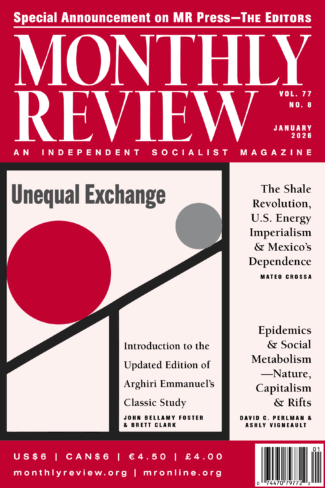February 1, 2026
Frederick Engels's
The Condition of the Working Class in England…has long been regarded by historians as the most systematic and thoroughgoing analysis of the deplorable conditions of the industrial working class in early Victorian England available from the times. Nevertheless, given the role that Engels's book played in the development of historical materialism, there have been continual attempts in the reigning ideology to prove his analysis wrong, all of which have failed dismally.
February 1, 2026
Using historical databases and quantitative analysis, Thomas E. Lambert calls into question the assertion that the trans-Atlantic slave trade can be considered a separate phenomenon from, rather than a major supporting factor in, the Industrial Revolution in England. Asserting otherwise, he writes, is a to deny "a horrifying and inhuman part of the global history of capitalism."
February 1, 2026
Despite its relatively small size, Mauritius increasingly is looming large in the geopolitical jostling in the Indian Ocean region. Tracing the country's often overlooked role in global affairs from the sixteenth century up until the present day, Stefan Gua provides readers with an insightful account of how politics both inside and outside of Mauritius reflect broader debates about colonialism, militarism, and self-determination.
January 1, 2026
This month's "Notes from the Editors" celebrates the accomplishments of Michael Yates, who is retiring as editorial director of Monthly Review Press. Michael's books and articles have had a tremendous impact on the work of Monthly Review as a whole, and will be sorely missed. The editors also welcome the new editorial director of the Press, Arun Kundnani, an accomplished scholar who promises to carry on the MR tradition while bringing a fresh perspective to our collective efforts.
December 1, 2025
As part of our special issue on the legacy of former
MR coeditor Robert W. McChesney, December's "Notes from the Editors" revisits his prescient insight into the rise of neofascism in the U.S. While the threat is undeniable, he wrote, "the good news…is that there is nothing inexorable about the victory of fascism. There is another road out, and that road is socialism."
December 1, 2025
Writing upon the fiftieth anniversary of his graduation from Pomfret School in Connecticut, Robert W. Chesney shares in his own words the story of his intellectual development, from his teen years through his studies at The Evergreen State College, and how they shaped his career as a journalist and activist—including his role as coeditor of
MR.
December 1, 2025
In this reprint of a
Seattle Weekly article from 2004, Knute Berger details a game of Monopoly played among friends, including Robert W. McChesney and John Bellamy Foster, while students at The Evergreen College. With sly insight, Berger shows how Foster and McChesney's antics as board game robber barons revealed McChesney's perceptive analysis of the media landscape under capitalism and his passionate advocacy for democratic, monopoly-free media.
December 1, 2025
To conclude our special issue on Robert W. McChesney's legacy,
MR presents a series of tributes capturing his impact on the world around him. The diversity represented by these illustrious contributors, from his colleagues at the media watch group Fairness and Accuracy in Reporting (FAIR) to Senator Bernie Sanders, is a testament to McChesney's enduring influence.
November 1, 2025
Helena Sheehan reflects on the evolution of her intellectual political relationship to China, a journey that began with limited knowledge of a seemingly far-away land and ends with a nuanced understanding grounded in her on-the-ground experiences as a visiting professor at Peking University. Through political and cultural analysis, Sheehan gives readers a peek into what how the Chinese Revolution continues to unfold.
November 1, 2025
In this reprise from April 2000, John J. Simon explored the consequences of the landmark Supreme Court case
Sweezy v. New Hampshire, which saw
MR founding editor facing off against the state of New Hampshire after refusing to respond to questions concerning his political activities. While the case is often seen as marking the waning of McCarthyism,
MR editors had a different view: the decline was due to the successful ascension of capitalist interests in U.S. society. "The extreme right had served its purpose, Simon noted, "and could now be reined in."










